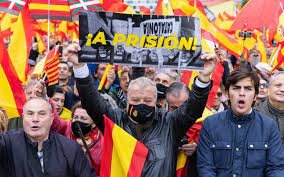Spain’s Socialist Party has reached an agreement with an emerging separatist Catalan party to support current Spanish Prime Minister Pedro Sánchez in creating a new government as a substitute for potentially thousands of persons participating in the region’s failed secession campaign receiving amnesty.
Mr. Sánchez, 51, is currently serving as acting prime minister following the unclear snap elections he called in July. He supported the amnesties related to the illegal referendum that shook Spain in 2017 in order to win the crucial support of the Junts party, which supports Catalonia’s northern region to become independent of Spain.

With approval from them, Mr. Sánchez is expected to avoid fresh elections, get parliamentary support for a second term as prime minister, and establish himself as the progressive leader of the European Union.
In an effort to dissuade the notion that the agreement was the result of purely political calculation, Mr. Sánchez’s supporters framed the idea as being crucial to ending a turbulent and violent chapter in Spanish history.
Support for each measure, according to Junts, which want another independence vote, would depend on how well negotiations regarding Catalonia’s political dispute go.
The investiture will be debated and put to a vote on November 15 and 16, according to parliamentary sources cited by elDiario.es.
The nation’s mood has become fiercer as a deal between Junts and the Socialists has gotten closer over the past week, with protesters clashing with police outside the Socialist offices in Madrid.
Protests from Civilians
On Thursday, hundreds of demonstrators opposed to the amnesty agreement marched toward the Socialist party headquarters in Madrid while carrying Spanish flags. There were also protests going on in Valencia and Barcelona.

On Thursday, Alberto Nunez Feijoo, the leader of the PP (People’s Party), called for more demonstrations across Spain.
“Dragging our country towards a total and irreversible humiliation,” he charged Sanchez. “Our civil resistance will be long.”
Up to 1,400 lawmakers and activists who participated in the effort to split Catalonia from Spain might be cleared with an amnesty.
Carles Puigdemont, the head of the Juntas who is presently living in exile in Belgium due to accusations he faced as the leader of Catalonia during the 2017 separatist movement, is one of the supporters.
Puigdemont would be allowed to return to Spain and perhaps run for governance if Congress accepted the amnesty.
Catalan’s Changed Perspective
The Catalan separatist movement’s leaders organized an illegal independence referendum in 2017, sparking the biggest constitutional crisis Spain has seen in decades.
Potential amnesty recipient Jaume Clotet, a former Catalan government communications chief who is currently awaiting trial for his involvement in setting up a website supporting the referendum, stated that he was in favor of amnesty if it meant “setting the counter to zero,” but not if it meant erasing the events of the independence drive. A joint statement by a number of judges’ associations denounced the agreement’s mention of “lawfare,” a term Junts allegedly coined to characterize the use of the legal system to target pro-independence campaigners. The agreement suggests looking into these issues through the legislative branch.

The justices declared, “There is a system of judicial guarantees that averts these risks and the Spanish judiciary is independent, not subject to political pressure.”
Is Catalan support enough for Sánchez?
Sanchez’s attempt to establish a government, he came to an agreement to govern in partnership with the hard-left Sumar platform, but he still needs the support of a number of minor parties in an installation vote.
Currently, in order to win a first round vote in the 350-seat legislature and a simple majority in a subsequent vote, the Socialists would still need the backing of Junts and not an absolute majority of 176 members.
The Basque Nationalist Party, which gave early support but stated it would wait to confirm until it saw the specifics of a Socialist-Junts agreement, is still in need of five lawmakers’ support.
The agreement’s details are still under wraps, but it is anticipated to be presented to the Spanish Parliament the next week.
It took more than two months of discussions between Sánchez’s Socialist party, his own, more progressive partners, and the Catalan and Basque independence movements which, despite their poor performance in July’s election, still had enough clout to impose a deal, for the agreement to be reached.
At a press conference in Brussels on Thursday, Mr. Puigedemont declared his continued support for the cause of independence. He also praised the agreement, claiming it returned the debate to the public domain and removed it from the court system.
He stated, “It is a way to get back into politics.”
By November 27, the voting must be completed; else, a new election will be held automatically.












Comments 1